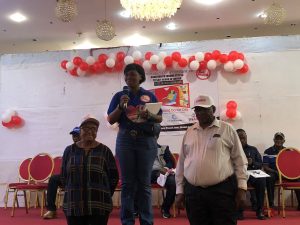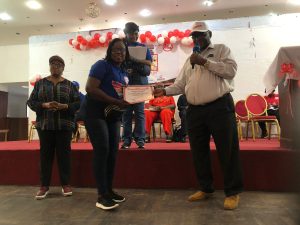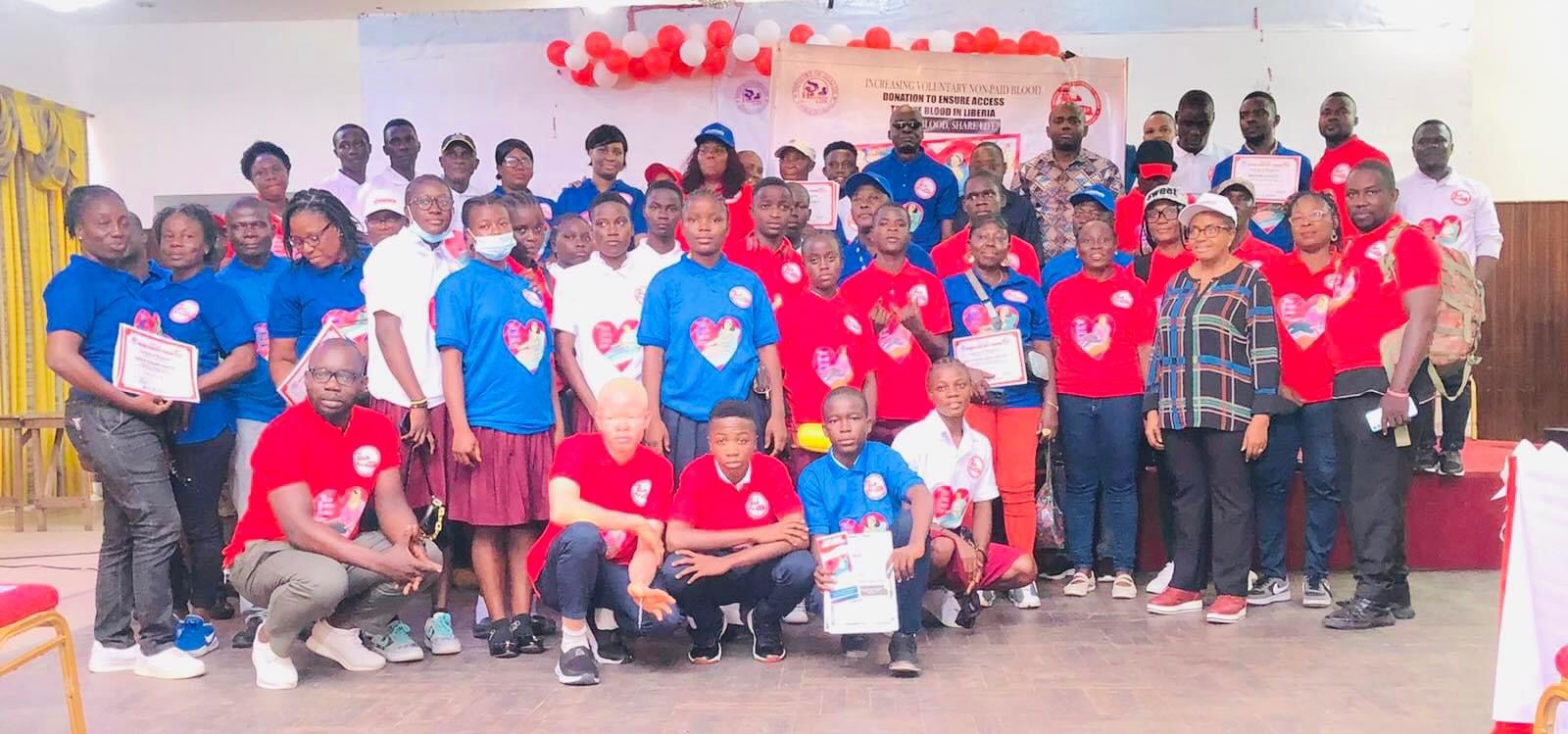Monrovia, Liberia – June 14, 2024 – In commemoration of this year’s World Blood Donor Day, the Ministry of Health (MOH), through the National Blood Safety Program, certificated several blood donor institutions for their commitments to fostering a culture of voluntary blood donation and ensuring the availability of safe blood for those in need across the nation.
Over 20 academic institutions including the Open Bible Junior & Senior High, Bassa High, Monrovia Vocational Training Center, LOIC Vocational Training School, John Flomo Barkalu High, Lofa County Baptist High, Zorzor Lutheran High, Zorzor Central High, were honored.
Counties like Bong, Nimba, Lofa, Margibi, and Grand Bassa, with the highest blood donations, were certificated in recognition of their outstanding contributions to blood safety and availability in Liberia.
The 20th World Blood Donor Day was observed under the theme “Increasing Voluntary Non-Paid Blood Donation to Ensure Access to Safe Blood in Liberia.”
This theme conveys a message of encouragement and hope, that improved access to safe blood supply is possible and would turn the tide against maternal and neonatal mortality. The Slogan for this year’s celebration is “Give Blood, Share Life”.
The event was held at the Monrovia City Hall, as esteemed dignitaries and stakeholders gathered to mark this important occasion.
Student Musa Ware Jr., representing the Bishop Marweh Institute, read the proclamation made by His Excellency President Joseph Nyuma Boakai, declaring World Blood Donor Day a working holiday throughout the Republic of Liberia.
The Proclamation stresses that being conscious of the dangerous effects of a lack of safe blood supply, Liberia joins the global community, on Friday, June 14, 2024, to celebrate “World Blood Donor’s Day”.
The Presidential Proclamation furthers that World Blood Donor’s Day mobilizes government, political, and social authorities to commit to effectively reducing mortality related to a lack of safe blood supply.
 A highlight of the event was the keynote address delivered by the Chief Medical Officer of the Republic of Liberia, Dr. Catherine Cooper.
A highlight of the event was the keynote address delivered by the Chief Medical Officer of the Republic of Liberia, Dr. Catherine Cooper.
She emphasized the significance of blood donation, stating that “blood is the biggest gift in the world.”
Dr. Cooper urged citizens to donate blood to save lives and foster community solidarity.
“Studies have shown that voluntary donors are likelier to be honest about their health status and risk factors, leading to safer blood supplies. Moreover, a culture of voluntary donation fosters community spirit, solidarity, and a sense of shared responsibility for the well-being of our fellow citizens,” she emphasized.
Dr. Cooper also underscored the critical role of blood donation in addressing challenges related to newborn and maternity care, highlighting its role in reducing maternal mortality rates.
“Voluntary non-paid blood donation is the safest and most effective way to ensure a steady and reliable blood supply.
Unlike commercial or family replacement donations, voluntary donors are motivated purely by the desire to help others, significantly reducing the risk of infections and ensuring the highest quality of blood,” she said.
Dr. Cooper: “Creating a culture of voluntary blood donation in Liberia requires all of us to come together from all sectors. It involves raising awareness, dispelling myths, and fostering a deep sense of community responsibility. And we can do this through a nationwide education and awareness campaign, by incentivizing Regular donations, Strengthening Infrastructure, engaging the youth, and partnerships and collaborations.”
The Chief Medical Officer expressed heartfelt gratitude to the Ministry of Defense for their invaluable support in organizing blood donation drives across three military barracks. This collaborative effort aimed at engaging diverse sectors of society in promoting blood donation and ensuring a sustainable blood supply for all.
Delivering a statement on behalf of the World Health Organization (WHO) Regional Director, Dr Matshidiso Moeti, Moses K. Jeuronlon highlighted the critical role blood transfusion plays in the provision of lifesaving health care.

Vulnerable people, such as mothers during childbirth, under-nourished and malaria-affected children, victims of trauma and accidents, and patients suffering from sickle cell and other chronic diseases, particularly benefit from this care.
“We join the international community to mark the selfless act of donating blood. World Blood Donor Day is not merely a date on the calendar; it is a celebration of altruism, empathy, and social responsibility. It is a day to acknowledge and honor blood donors whose acts help save the lives of others,” he averred.
The WHO Regional Director’s proxy expressed the world health body’s gratitude to blood, plasma, and platelet donors in the African region and the world for their lifesaving donations.
Appreciating blood donors in the region and worldwide, Jeuronlon pointed out the numerous transformative stories of blood donation that share a common thread of compassion and humanity.
He said, in the past decade, the World Health Organization has provided technical and financial support to its member States in their efforts to improve blood product availability, quality, and safety through developing and implementing policies, strategic plans, norms, standards, and guidelines; establishing the regulatory system for blood, blood components, and blood products.
He also named building capacity of national regulatory authorities and National Blood Transfusion Services to execute the effective regulatory oversight and coordination needed to ensure the implementation of quality standards; and strengthening collaboration with partners to promote WHO leadership in developing and implementing best practices in blood quality and safety in the region.
Mr. Jeuronlon said despite these improvements, countries must address the persistent challenges in the availability of safe blood and blood products.
Through collective efforts, he acknowledged, the countries must raise adequate and sustainable funding, continue to build systems and capacities to increase blood donation rates, and separate donated blood into its components that can be stored for long-term use.
Currently, African countries collect only 5.2 units of blood for every 1000 people, below the ten donations or more per 1000 people recommended by WHO and far from the 33 units of blood per 1000 people collected in developed countries.
In addition, only 18 out of 47 2 countries had reached the regional target of at least 80% of blood supply from Voluntary Non-Remunerated Blood Donors. Yet, the demand for blood remains constant, while the supply often falls short.
This 20th anniversary is fitting to reflect on achievements, address challenges, and envision a future where safe blood transfusion is universally accessible.
This celebration provides a platform to appreciate voluntary, non-paid blood donors for their life-saving contributions and to raise public awareness of the need for the availability and appropriate use of safe blood and blood products.



